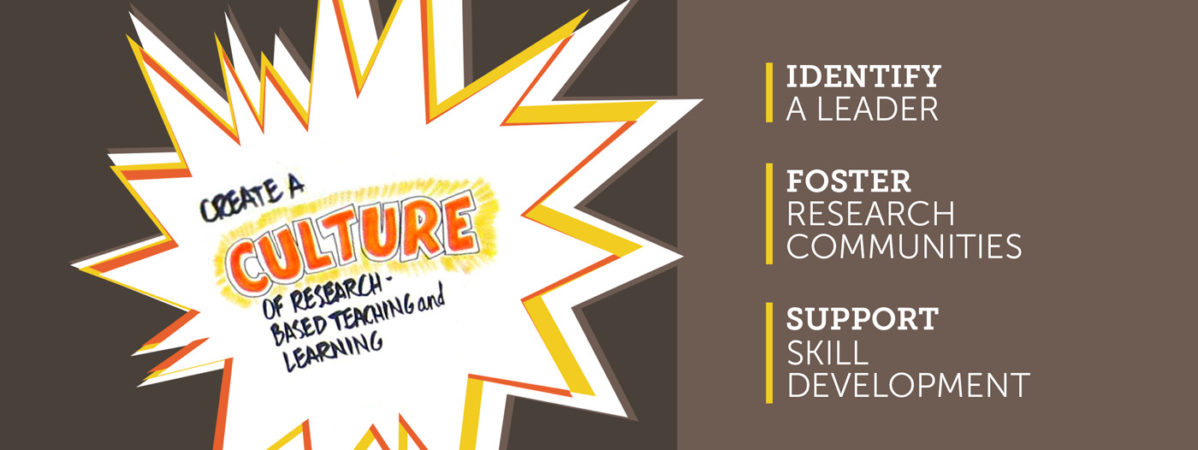
July 20, 2015 | By Digital Promise
Yet, teachers tell us they lack the time and confidence to sift through the overwhelming amount of research online, and analyze and adapt findings to their unique group of students. This results in missed opportunities to find and implement practices that could improve student learning.
As we talked with educators at our Research Summit and in our League of Innovative Schools, we heard a recurring theme: teachers (and innovation) thrive in a “culture of data” where research use is encouraged, and staff are given opportunities to build their research skills. Administrators play a key role in fostering this culture throughout the district.
Based on feedback from educators, here are three ways administrators and district leaders can build a culture of research:
While all educators can benefit from basic skills in analyzing research and data, not every teacher needs to be an expert. Instead, districts can identify a research leader or “champion.” According to ResearchED, a research champion can connect teachers with research and “make it easy for classroom teachers to be more informed about what they do.”
For example, Eian Harm is West Ada School District’s Research and Special Projects Coordinator. He helps teachers find research and collect data to solve challenges in their classrooms, and assess the effectiveness of new approaches. Externally, he coordinates partnerships with universities and research organizations interested in doing research in district schools. He makes sure all projects align with the district’s overall mission and strategy, which allows administrators to inform stakeholders how data informs decisions.
If a formal staff position is not possible, districts can still find creative ways to identify an informal “research champion.” As Summit participant Bart Epstein told us, “There are always a couple of teachers in the school who really love data, and they want to dive into it. Those teachers play a really important role in helping to translate the sometimes arcane academic findings into intelligible findings that their peers can use.”
In addition to having a “research champion” to support their work, teachers want opportunities to build communities with colleagues interested in similar research questions. Carroll advocates for “creating some kind of common platform where we could help each other by sharing our information on how we incorporated research into practice.” Administrators can foster either in-person or virtual communities for district teachers to share research resources and expertise.
Additionally, administrators can model a community approach to research at the district level by building research partnerships. Several League districts regularly partner with local universities to conduct research. Research organizations are also an option, such as Lucas Education Research, Harvard Research Schools, the University of Chicago Consortium on Chicago School Research, Hanover Research, and Regional Educational Laboratories (RELs).
With the support of a partner organization, administrators could also consider Design-Based Implementation Research, which involves teachers, students, parents, and community members in research projects that address current challenges in the district. Collaborative projects that involve all stakeholders can go a long way to creating a culture where innovation can flourish.
Educational technology tools provide more student data and options for classroom research than ever before. To take advantage of these tools, many teachers need to build new skills in data collection and analysis, and research implementation. Serena Hicks, a teacher at West Ada, wrote about how her colleagues felt intimidated by research. She encouraged them to experiment with action research methods by developing their own research questions, collecting data, and using what they learn to guide their teaching. Administrators can support teachers’ grassroots research efforts by showcasing and recognizing their work, and incorporating it into the evaluation process.
Administrators can also support teachers’ formal professional development in research skills. First, as key stakeholders, they can advocate for expanded research curricula in college and university teacher preparation programs. In this way, future teachers and those pursuing graduate studies will gain stronger skills in conducting and applying research. Second, as a more flexible option, summit participants recommended developing research literacy micro-credentials, which would identify research competencies each teacher could develop at his or her own pace. Through these micro-credentials, as well as others on topics like data literacy, teachers could gain recognition for their research skills and help spread a culture of data use within their schools and districts.
Finally, administrators can lead by example and build their own skills in data use and research. According to Harm, “Administrators have a tough job. They need to take research findings and data, and inspire people with it, and take action.” Administrators who are confident in their research skills can use data as evidence to rally public support. Further, they can more confidently support teachers, and make the most of relationships with research partners.
Through these three steps, administrators can position districts to take full advantage of the ever-growing body of knowledge about student success. Summit attendee Michael Jay cites the importance of building teachers’ research skills, but adds that administrators need to trust “an educator who is tuned into student learning and can really read the student about what’s working, what’s not.” Empowering teachers and staff across the district to combine their wisdom and intuition with research yields powerful results.
In June 2015, Digital Promise gathered educators, technology developers, and researchers to identify ways to put research to work to improve learning outcomes for all students. Learn more about our discussions.
By AJ Foster and Babe Liberman
By Josh Weisgrau and Teresa Solorzano